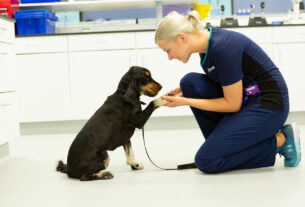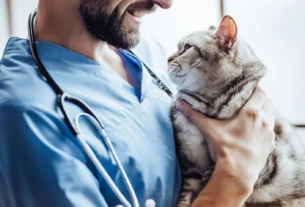Emergency vet near me
Having an “emergency vet near me” is very valuable in case your pet requires urgent attention. Just like humans, pets have accidents, get sudden illnesses, or even develop symptoms that require immediate veterinary care, which more often than not occurs at night, during holidays, or on the weekend. Having an emergency vet nearby could make all the difference to the health of your pet when every minute counts.
Nearest emergency vet clinics
What is wrong with your pet?
- Vomiting in pet emergency care
- Pet not eating emergency vet care
- Pet bleeding emergency care
- Pet broken bone treatment
- Other pet symptoms
Nearest emergency vet clinics
What is wrong with your pet?
- Vomiting in pet emergency care
- Pet not eating emergency vet care
- Pet bleeding emergency care
- Pet broken bone treatment
- Other pet symptoms
When to Go to the Emergency Veterinarian
Knowing when your pet requires emergency veterinary attention is really important. Following are some common signs and situations that mean you should go immediately to an emergency vet.
1. Vomiting or Diarrhea: Although an isolated bout of stomach upset is common, frequent vomiting or diarrhea-especially if containing blood-can indicate a more serious problem.
2. Labored Breathing: This could be manifested in heavy panting, gasping for air, or even struggling to breathe. All these signs could point to problems of the respiratory system or even heart issues.
3. Sudden Changes in Behavior: Lethargy, unresponsiveness, aggression, or extreme anxiety can all be indicative of potential emergencies.
4. Uncontrolled Bleeding: If injuries, bites, and scratches refuse to staunch, this calls for immediate medical help.
5. Trauma: If your pet has been run over, fallen from any height, or has suffered some form of physical trauma, intervention from an emergency vet is of utmost importance.
Other common emergencies to be aware of include poisoning-which can arise from toxic food, plants, and chemicals-seizures, and signs such as bloating, indicative of life-threatening conditions in some breeds of dogs.
How to Find an Emergency Vet Near You
Finding an emergency vet might be an obstacle, especially in a moment of distress. Here are some steps that will help you find an emergency vet as quickly as possible:
1. Use Search Engines: The easiest thing you can do is type “emergency vet near me” in Google or another search browser, and it will provide you with a list of all the emergency veterinary clinics nearby. Most of those listings will include everything from hours and contact information to even reviews.
2. Online Directories: Many online directories focus their attention on emergency veterinary services concerning pets. Websites like the American Animal Hospital Association, commonly referred to as AAHA, and VCA Hospitals allow online searching to find an accredited veterinary clinic, which also includes facilities offering 24/7 emergency care.
3. Mobile Applications: Applications like Rover and the American Red Cross’s Pet First Aid will also help you locate an emergency vet near you, and give you some pretty helpful tools to perform some basic first aid where needed.
Most areas do not have routine veterinary clinics that are open around the clock. If your veterinarian only has business hours, learn if they have a partnership with an emergency clinic for after-hours service or can make recommendations.
What to Expect at an Emergency Vet Visit
Knowing what to expect during a visit to the emergency vet can help take some of the anxiety out of the process. Upon arrival, you may be attended by a technician initially, who will have a few questions regarding your pet’s symptoms and basic information. Because every minute counts in cases like these, the veterinarian will often begin the initial examination straight away, checking your pet’s vital signs and general condition.
Your pet may require diagnosis through X-rays, blood work, or ultrasounds, depending on the severity of your situation. These tests are important in ascertaining the actual cause of the symptoms and, consequently, the best course of action. In other instances, emergency surgery may be needed, along with IV fluids and intensive care, to get your pet stabilized.
Veterinary emergency services do indeed vary in cost, so it is wise to know up-front about general fees and what payment options may be available. Many clinics indeed have plans or are able to refer you to pet-specific insurance or credit options that will help ensure your pet gets the care they need.
Preparing for Pet Emergencies in Advance
The best proactive step any pet owner can make is being prepared for a pet emergency before one happens. Following are a few ways you can be prepared:
1. Know Your Closest Emergency Vet: Know what veterinary emergency clinic is nearest to you and save their contact information somewhere easily accessible to you-like on your fridge or saved in your phone.
2. Create a Pet Emergency Kit: Include bandages, gauze, a pair of tweezers, and saline solution. Most simple first-aid items can work to sustain your pet until you reach the vet.
3. Keep a Pet Health Record On File: Store health records pertaining to your pet in one file that would include vaccinations, medication, and chronic conditions. Having this on hand can help you save precious time in case of an emergency visit.
How important it would be to have close to you an emergency vet whom you can trust.
Having an emergency vet one trusts in close proximity gives peace of mind, knowing that, whatever the situation may be, the pet has its best possible chance for timely treatment. Researching local emergency vets ahead of time is highly advisable if one is moving or new to pet ownership. Emergencies are completely unexpected, but having a plan put in place ensures you are prepared for fast and confident action the moment it means the most in your pet’s life.
Whether it’s something as minor as an injury or a full-on health crisis, the knowledge that there is an emergency vet nearby to support you and your pet makes all the difference in the world. Storing emergency vet contact information in an easy-to-reach place and knowing when and how to seek emergency care are important steps in safeguarding your pet’s well-being.





